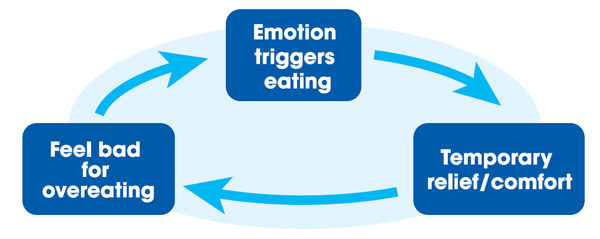Your teenage daughter, who had been working very hard for a major exam, received her result and was very disappointed with it. Later that day, she brought several packs of potato chips into her room. “I feel so bad about my result. I want to eat all these.” Sound familiar?
It may be a case of emotional eating, whereby a person increases food intake in response to or as a way to soothe certain feelings, especially negative ones such as stress, tension, sadness, boredom, loneliness or anxiety. Emotional eating behaviour happens when people eat not to satisfy hunger, but for comfort; hence the term ‘comfort food’. This can lead to an unhealthy cycle, becoming a habit that continues into adulthood, which increases risks for health-related problems such as obesity, diabetes, and hypertension. There are also studies linking emotional eating with poor cognitive performance, particularly in obese adolescents.
Is it physical or emotional hunger?
When you are under stress, your body produces more cortisol leading to increased appetite, causing emotional hunger. Eating sugar and carbohydrates can also trigger the release of dopamine, which is why you feel ‘comforted’ by binge-eating. It can be difficult to differentiate emotional hunger from actual physical hunger. Here are a few pointers:
Physical hunger
- Comes on gradually and can be postponed.
- Can be satisfied with any type or quantity of food.
- Likely to stop eating when full.
- Doesn’t cause feelings of guilt.
Emotional hunger
- Feels sudden and urgent.
- Causes very specific cravings (e.g. for pizza, ice cream, fries etc.).
- Tend to eat more than normal.
- Can cause guilt afterwards.
Curbing emotional eating
No one is 100% free from emotional eating. There are times when even you will succumb to your cravings after a hard day at work. Your teenager tends to give in easier to their emotional hunger due to their hormonal changes. However, there are ways we can control this tendency from becoming a habit.
- Check hunger. Ask if she is really hungry or if it is just emotional hunger? If she just had lunch an hour ago and her stomach is not rumbling, it may be just a craving. Give it time to pass by doing other activities or drinking water.
- Manage stress. Emotional eating is mainly caused by stress. Find the source and solve it. Manage stress by meditating, exercising regularly, and getting enough sleep.
- Tackle boredom. Simply being bored can also lead to munching. Instead of grabbing a snack when bored, advise her to go for a walk, listen to music, read a book or indulge in a hobby. Find a replacement activity to escape emotional eating.
- Avoid temptation. Do not keep her favourite comfort food at home. Delay the trip to the grocery store if she is feeling angry, sad, or frustrated.
- Choose healthy snacks. Replace her usual comfort food with low-calorie snacks, or pick healthier options such as fruits or whole-grain unsalted chips.
- Food journal. Ask her to keep a record of her eating habits, i.e. what, when, and how much she eats, as well as her mood when eating. Over time, she will start to see links between food and mood, and this can help her make better choices.
- Be an example. You are your children’s role model. They learn your habits through observation. If they see you eating ice cream whenever you are sad, they may develop the same habit when they are older.
- Don’t reward with food. If you give cookies to stop your children from crying, they may start to associate cookies with comfort. Avoid rewarding or disciplining them using food as they may ‘learn’ emotional eating as they grow up.
The trouble with emotional eating is that once the pleasure of eating is gone, the underlying feelings that cause it remain. Don’t be afraid to seek expert’s help if the problem worsens. Nutritionists can help identify unhealthy eating patterns, and therapists can help her deal with the sources of stress or depression. Take control of your family’s diet today!
An educational collaboration with Nutrition Society of Malaysia.









Comments